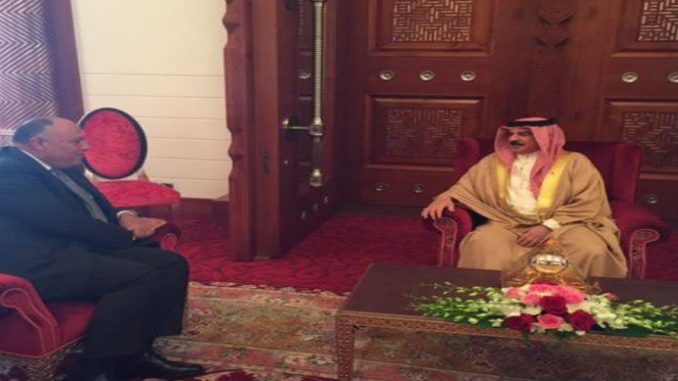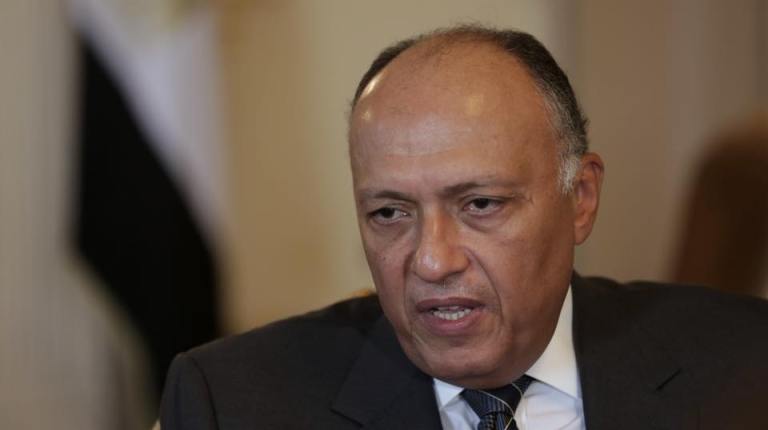
Egypt’s Foreign Minister Sameh Shoukry visited Bahrain on Wednesday and said that he was assigned by Abdel Fattah Al-Sisi to deliver a message to the king of Bahrain, stressing the importance of enhancing bilateral relations in all fields.
FM Shoukry met with the Bahraini foreign minister and the prime minister.
Shoukry told his Bahraini counterpart Khalid bin Ahmed Al-Khalifa that this is a message of solidarity with the Bahraini people.
During the meeting, Egypt’s Foreign Minister discussed the bilateral relations between Egypt and Bahrain and also tackled the turmoil in several countries in the Middle East.
Talks between Shoukry and Al-Khalifa mainly focused on discussions regarding all fields of bilateral cooperation between the two countries, including enhancing relations in the fields of economy, trade, and tourism.
In addition, Shoukry and his Bahraini counterpart discussed the political turmoil in Syria, where Al-Khalifa was informed of Egypt’s position on the current Syrian crisis and what solutions are possible to settle the turmoil.
Shoukry stated that all factions in Syria should cooperate to reach an inclusive political solution.
Furthermore, Shoukry met with Bahraini Prime Minister Khalifa Ben Salman Al-Khalifa along with other Bahraini officials where they discussed bilateral relations between Egypt and Bahrain and the political turmoil in the Middle East.
Shoukry’s visit to Bahrain comes amid growing tension between Cairo and Riyadh especially after the final verdict of Egypt’s High Administrative Court that rejected the handover of Tiran and Sanafir islands to Saudi Arabia.
The verdict has caused tremendous outrageous and anger among Saudi circles as they considered it a betrayal from al-Sisi regime after the Kingdom’s generosity since the military coup in 2013 that overthrown Egypt’s first democratically elected President Mohamed Morsi.
Saudi Arabia has poured billions of dollars to al-Sisi’s military regime to stabilize his rule, for nothing in return.
Al-Sisi regime’s anti-Saudi moves
– Egypt participated in Grozny Conference in Chechnya last September which excluded the Salafists (mainly in Saudi Arabia) from Ahl-al-Sunnah’s definition (a religious term referring to most Muslims all over the world except for the Shiites).
The conference aimed to isolate Saudi Arabia religiously and politically as the Saudi religious institutions and scholars weren’t invited to the conference.
Moreover, the conference has also accused the Saudi kingdom and its ideology with fueling extremism which were, in fact, dangerous accusations to the kingdom and a stab in the back from a close ally as Egypt while the Kingdom is facing many threats from Iran and its arms in Syria, Iraq, Lebanon, and Yemen.
– Last October, Egypt voted in favor of a Russian-backed draft resolution in the UN Security Council on Syria, which was opposed by Saudi Arabia.
As a result, Egypt’s stance angered Egypt’s major Gulf backer which condemned Egypt’s vote and described it with the” painful” stance.
After the voting, the Saudi ambassador to the UN, Abdullah al-Mouallimi said, “It was painful that the Senegalese and Malaysian stance was closer to the Arab’s consensus than the Egyptian delegation.”
He also said that he feels pity for these countries that voted for the Russian resolution, stressing that his country will continue backing the Syrian people by all means.
Two days following the voting, Saudi state-owned oil company Aramco announced halting oil product supply to Egypt.
The sudden halt triggered a scornful media campaign against Saudi Arabia, as it was seen as a political decision. On the other side, Saudi journalists and media men criticized the Egyptian regime and blamed the Kingdom for its financial generosity with the al-Sisi regime.
In addition, a war of words was launched by the Egyptian media against the Saudi Kingdom which pushed Saudi activists to launch a hashtag apologizing to President Mohamed Morsi for the “Kingdom’s support for the military coup” in Egypt.
Some observers believe that Sameh Shoukry’s visit aimed to break the ice with Saudi Arabia through Bahrain especially that Shoukry stressed in his words in Bahrain that the visit came in the context of working on the unity of the Arab stances against the challenges and risks that surround the region.



